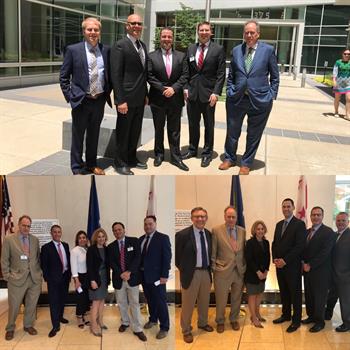
On the first of January, most Class I railroads institute a new scheduling policy called Precision Rail Scheduling that, among other things, reduced or removed credit days for rail cars that resulted in incredible increases in demurrage charges for the first quarter of 2019. As a result of the outcry from rail shippers, the Surface Transportation Board (STB) held two full days of hearings with rail shippers and railroads testifying and answering questions from the STB. ReMA submitted a statement and two ReMA members, Ben Abrams, Consolidated Scrap Resources and Bobby Triesch, SA Recycling, testified. ReMA was able to set the tone for these hearings focusing on free or credit days for railcars as well as the differences between the treatment of private versus system cars. ReMA also explained that scrap facilities are often legacy sites in congested industrial areas that cannot be altered or expanded to handle additional cars to prevent demurrage charges. Additionally, poor rail service is mostly to blame for bunching and the resulting demurrage charges. The STB Members questioned the railroads extensively on these points.
Following the demurrage hearings, ReMA was able to reopen the STB proceeding regarding revoking the rail exemption for certain commodities including ferrous scrap that was originally begin in 2011 with a formal proposal in 2016. ReMA strongly supported the STB proposal in 2016 arguing that the rails had market dominance over the scrap recycling industry. We also explained the economy as well as the transportation services have dramatically changed since the rail exemption was adopted in 1996 to avoid the significant delays in filing tariff schedules. For instance, there are fewer class I railroads in existence than in 1996, trucks are not an option for longer hauls because of cost especially with electronic logging, driving regulations limiting distances, and a significant shortage of truck drivers. Furthermore, since 1996, the manufacturing base for steel has shifted away from the legacy areas as secondary steel production has moved to places such as North and South Carolina, Alabama, and Texas. However, existing scrap recycling facilities have adapted by using rail to ship ferrous scrap to these new steel mills and foundries. The ferrous scrap recycling industry is heavily dependent on rail service to both receive and ship ferrous scrap to its customers and most steel mills prefer or will only accept ferrous scrap in rail gondolas.
After winning approval to meet with the STB, ReMA followed up with 30 ex parte meetings with the STB over a two week period. Ten ReMA members met with each STB Board Member describing the adverse impacts from the demurrage policies and arguing that the industry needs the rail exemption revoked to provide a more level playing field with the railroads. ReMA has also met with U.S. Senators to keep them informed on the impacts from poor rail service and demurrage charges.
The Summer Congressional Fly-In will focus on transportation, workforce development, and other issues.